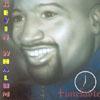Legendary jazz keyboardist and producer George Duke once described vocalist Kevin Whalum as "butter," and that's about the best depiction I've heard. Whether covering soul, jazz, scat or gospel, Whalum's smooth, sweet voice (think of Will Downing as a tenor) makes him one of the most exciting new artists I've heard in quite awhile.
The younger brother of noted jazz saxman Kirk Whalum, Kevin grew up in Memphis in the shadow of Olivet Baptist Church, where his father, the Rev. Kenneth T. Whalum, served as pastor. The church, known as a magnet for great singers and musicians, became a centerpiece of Kevin's life as a youngster, creating both a religious and a musical foundation for him. Young Kevin observed and absorbed the music at Olivet, all of which influenced him as grew.
Legendary jazz keyboardist and producer George Duke once described vocalist Kevin Whalum as "butter," and that's about the best depiction I've heard. Whether covering soul, jazz, scat or gospel, Whalum's smooth, sweet voice (think of Will Downing as a tenor) makes him one of the most exciting new artists I've heard in quite awhile.
The younger brother of noted jazz saxman Kirk Whalum, Kevin grew up in Memphis in the shadow of Olivet Baptist Church, where his father, the Rev. Kenneth T. Whalum, served as pastor. The church, known as a magnet for great singers and musicians, became a centerpiece of Kevin's life as a youngster, creating both a religious and a musical foundation for him. Young Kevin observed and absorbed the music at Olivet, all of which influenced him as grew.
After graduating from Morehouse College, Whalum moved to Chicago, where he worked as a pharmaceutical sales rep during the day and played with a band called Fast Forward at night. It was there that he met his wife Camille and married in 1996. Two years later, he moved to Nashville, which was then becoming the epicenter of an exciting confluence of gospel, jazz, soul and folk led by such artists as Tommy Sims and Michael McDonald. Still moonlighting as a musician, Kevin appeared as a guest vocalist on brother Kirk's noted 1997 release, The Gospel According To Jazz, Chapter 1, and as part of Kirk's band at that year's Stellar Awards. A couple years later he made the musical plunge, turning his night job into his full-time job, and becoming a popular live and session vocalist in the burgeoning Nashville Soul Music scene.
His journey ultimately led him to create Timetable, his independently released debut album. Timetable is the result of many years of dreaming and songwriting, and it sounds like Whalum is trying to condense a lifetime of experience on it, as the album moves among multiple genres while attempting to fully introduce Whalum and his talents to the audience. The result is an exceptional debut that, despite the various styles, comes across as a thematic album that focuses on Whalum's three loves: Faith, family and music (and sometimes conflicts between them).
The album's architecture is anchored by five interesting autobiographical spoken word pieces (in which Whalum tells his story and gives credit to his many musical influences) surrounded by groupings of songs, with each monologue bringing the album back to its roots from the interspersed musical wanderings. The first song grouping features "Tonight," a catchy, smooth jazz number that tells the common lament of a young couple with kids and too little time together, and the duet "Let Him Talk To You" (featuring Tiffany Palmer), a great upbeat cut that straddles smooth jazz and gospel like something from Angie Winans' excellent Melodies of My Heart. The next song group moves to a bluesier sound with the husbandly confession, "I Love Her Just the Way I Am" and the catchy "Can I See You Again." Later cuts cover gospel, funk, scat and more straight ahead jazz. And while some cuts display a clearer debt to Whalum's influences Bobby McFerren ("Too Much TV," "Classical Idea") and, to a lesser extent, Michael Franks ("Honeymoon In Monterey," "Queen of Style"), Timetable remains fully Whalum's album and never sounds derivative.
In a year where we've heard so many great independent releases, Timetable may be my favorite find for a number of reasons: The musicianship is top notch (brother Kirk's contributions on songs such as "Too Much TV" and "Groove Grow Move Know" are outstanding), the tunes are fine and Whalum's vocal performance is uniformly inspired. Equally important, however, is that Whalum uses each song to tell a intelligent, engaging story - from love-at-first site on "Can I See You Again," to a romantic kidnapping (?!?) on "Queen of Style." And it is clear from start to finish that Whalum is having fun singing on Timetable, and that intangible really enriches the album, making it equally fun to listen to. This is as good an album as you'll hear in 2004.
By Chris Rizik

